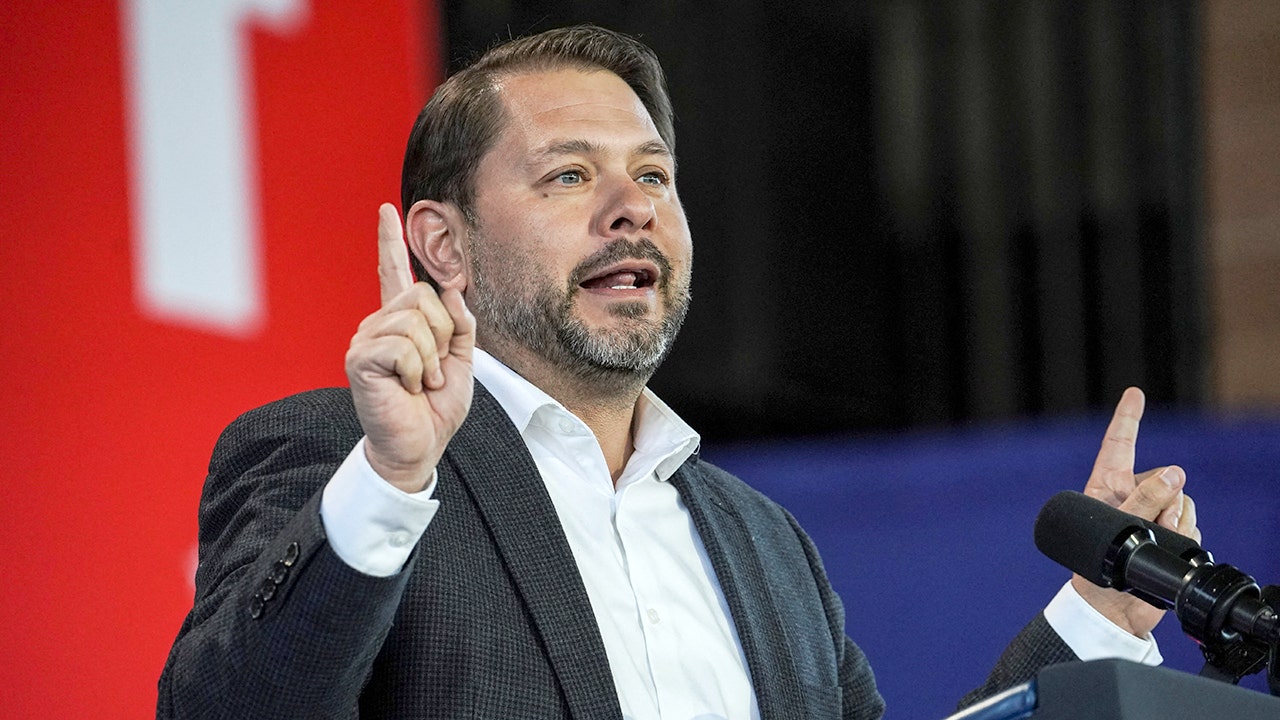Republican Rep. Scott Perry of Pennsylvania, former chair of the House Freedom Caucus (HFC), is calling on the Senate to make steeper spending cuts in President Donald Trump’s “one big, beautiful bill.”
Perry, one of the fiscal hawks who had pushed for more aggressive reforms to the vast tax and spending bill up into the final hours of its House passage early Thursday morning, believes the bill “has a long way to go” before it reaches the president’s desk. He is urging the Senate to pursue additional spending reduction in light of the bond market’s recent unease about persistent high budget deficits, and is optimistic from what he is hearing from across the Capitol thus far. (RELATED: 5 Issues That Might Decide Fate Of Trump’s ‘Big, Beautiful’ Bill In Senate)
“Typically, the bill gets weaker in the Senate,” Perry told the Daily Caller News Foundation in an interview Friday. “We feel that there’s an opportunity for the bill to get stronger.”
“As a proud Republican and House member and member of the Freedom Caucus it’s not my first inclination to quote [Republican South Carolina] Sen. Lindsey Graham, but Sen. Graham said just yesterday, ‘You’re talking about one and a half percent, so let’s not act like we’re really cutting a lot [in the bill].’ I completely agree with him.”
Graham, the top Republican on the Senate Budget Committee, appeared to dismiss a question from CNN’s Manu Raju on Thursday about the House Freedom Caucus urging GOP senators not to weaken the spending cuts in the bill.
“You had your chance,” Graham told Raju with a laugh. “Some of these cuts are not real. And we’re talking about over a decade — if you do a 1.5 trillion — that’s like a percent-and-a-half. So let’s don’t get high on our horse here that we’ve somehow made some major advancement in reducing spending because we didn’t.”
Perry readily concedes that he wishes the House-passed bill did more to achieve steeper spending reduction, but credited the House Freedom Caucus for pushing House GOP leadership to lock in more than $1.5 trillion in spending cuts over a ten-year period.
An initial proposal floated during House Republicans’ member retreat in Doral, Florida, in February outlined just $300 billion in savings.
“We have a long way to go,” Perry said. “But you’ve got to remember where we started.”
“That [amount of savings in the House-drafted bill] is five times higher because of our efforts,” Perry added.
He also cited a host of conservative wins that HFC members helped secure in final amendments to the legislation, such as accelerating the implementation of Medicaid work requirements, disincentivizing Medicaid expansion in some states and fast-tracking the phaseout of green energy tax breaks.
The president’s sprawling domestic policy bill is now under consideration in the Senate following its passage in the House by just one vote early Thursday morning — after HFC members supplied the necessary votes to back the bill. HFC chair Andy Harris of Maryland was the lone GOP lawmaker to vote “present.” Two Republicans joined all Democrats in voting against the bill.
“We still think we have work to do, but we want to advance the [President’s] agenda,” Perry said. “We want the tax cuts to happen. We need to deal with the debt ceiling. But we also need to deal with the spending in Washington.”
“This [House-passed bill] is the first swing,” Perry said. “I think that we not only can be optimistic, but I think we need to be aggressive, in kind of pushing them [the Senate] right, holding them up and encouraging them to stick with their own commitment to themselves.”
WASHINGTON, DC – MAY 21: Rep. Scott Perry (R-PA) (4th-R), accompanied by Rep. Chip Roy (R-TX) (3rd-R), Rep. Keith Self (R-TX) (5th-R), House Freedom Caucus chair Rep. Andy Harris (R-MD) (2nd-R), and Rep. Clay Higgins (R-LA) (R), speaks about the ongoing negotiations between House leadership, the White House and the House Freedom Caucus on the “One, Big, Beautiful Bill” at the U.S. Capitol Building on May 21, 2025 in Washington, DC. (Photo by Andrew Harnik/Getty Images)
Perry’s calls for more aggressive spending cuts in the president’s sweeping bill will have some natural allies in the Senate. Republican Wisconsin Sen. Ron Johnson, who is calling for a return to pre-pandemic spending levels, said he would oppose the House-drafted bill, citing the lack of spending reduction.
“Everybody likes the tax cut, but when you’re $37 trillion in debt on the path to over $60 trillion in debt, when the Social Security Trust Fund is running out, somebody’s got to be the dad that says, ‘I know everybody wants to go to Disney World, but we just can’t afford it,’” Johnson told reporters Thursday. “I guess that’s what’s going to have to happen here in the Senate.”
Republican Utah Sen. Mike Lee has championed a full repeal of green energy tax credits signed into law under former President Joe Biden. Perry is urging the upper chamber to eliminate even more subsidies under the Biden-era Inflation Reduction Act (IRA) and resist pressure from lobbyists to roll back certain phase-out dates of green energy tax breaks in the House-drafted bill.
“Every single Republican voted against it [the IRA] when it came to the floor, every single one,” Perry reflected. “The American people expect all those Republicans to honor that commitment at that time and not change allegiances and alliances after the fact.”
“From my standpoint, I don’t really care about the army of lobbyists and the few billionaires that are advocating for this policy,” Perry continued. “We have to do right by our people that get up in the morning and go to work and expect to come home and turn the lights on.”
Republican North Dakota Sen. Kevin Cramer told reporters Thursday that no GOP senator “gives a shit about SALT,” referring to the state and local tax deduction cap. House Republicans raised the SALT deduction cap to $40,000 — four times the current $10,000 limit — with certain income limitations to appease blue-state House Republicans whose constituents face high tax burdens.
The prospect of the Senate significantly lowering the SALT deduction cap is music to Perry’s ears. He told the DCNF that the Senate should absolutely reconsider the SALT cap raise in the House-drafted bill, arguing the deduction primarily benefits wealthy people in blue states and lets elected Democrats off the hook for keeping state and local taxes high.
“The people that I work for, my bosses, don’t feel like paying for the high taxes in California, New York and Illinois,” Perry said.
Perry said that Moody’s recent downgrade of the U.S. government’s credit rating and fears in the bond market about perpetual high budget deficits could heighten his colleague’s urgency to pursue steeper spending cuts than those incorporated in the House-drafted bill.
“What the United States does financially affects the entire globe, and if we don’t want to put the entire globe into a financial tailspin, just a few turns of the dial here can make a huge difference, and that’s what we’re going to continue to press for,” Perry told the DCNF. “We’re going to be very aggressive with that push.”
Senate Majority Leader John Thune has floated passing the tax and spending package by July 4. The legislation would then have to be voted on in the House for a second time before being signed into law by Trump — assuming the Senate makes modifications to the bill.
House Speaker Mike Johnson has urged the Senate to make minimal modifications to the House-passed legislation, citing the “delicate equilibrium” reached between conservatives and moderates to advance the president’s landmark bill.
All content created by the Daily Caller News Foundation, an independent and nonpartisan newswire service, is available without charge to any legitimate news publisher that can provide a large audience. All republished articles must include our logo, our reporter’s byline and their DCNF affiliation. For any questions about our guidelines or partnering with us, please contact [email protected].
Read the full article here






![DC Israeli Embassy Shooter Tied to Marxist Group Linked to China and Hamas [WATCH] DC Israeli Embassy Shooter Tied to Marxist Group Linked to China and Hamas [WATCH]](https://www.lifezette.com/wp-content/uploads/2025/04/2025.04.18-01.44-lifezette-68025747ab38e.jpg)
![Therapist Receives Threats After Calling Trump Derangement Syndrome a Real Pattern [WATCH] Therapist Receives Threats After Calling Trump Derangement Syndrome a Real Pattern [WATCH]](https://www.rvmnews.com/wp-content/uploads/2025/04/2025.04.08-03.02-rvmnews-67f53a978e44e.jpg)


![Adam Schiff Freaks Out At Donald Trump Over Saudi Visit, Despite Past Biden Cooperation [WATCH] Adam Schiff Freaks Out At Donald Trump Over Saudi Visit, Despite Past Biden Cooperation [WATCH]](https://www.rvmnews.com/wp-content/uploads/2024/10/2024.10.19-06.17-rvmnews-6713f7b77cfe3.jpg)

